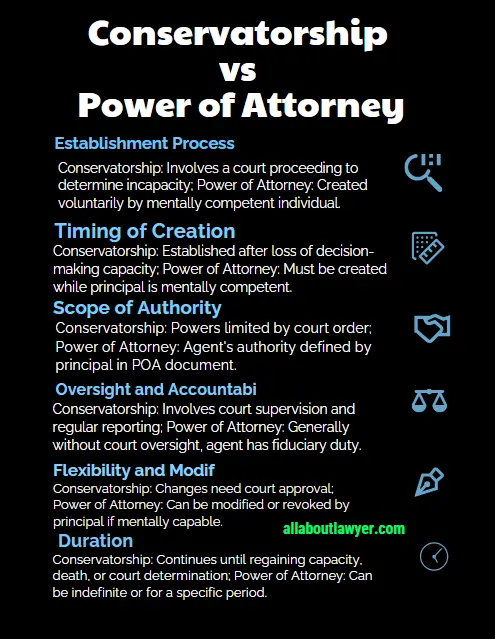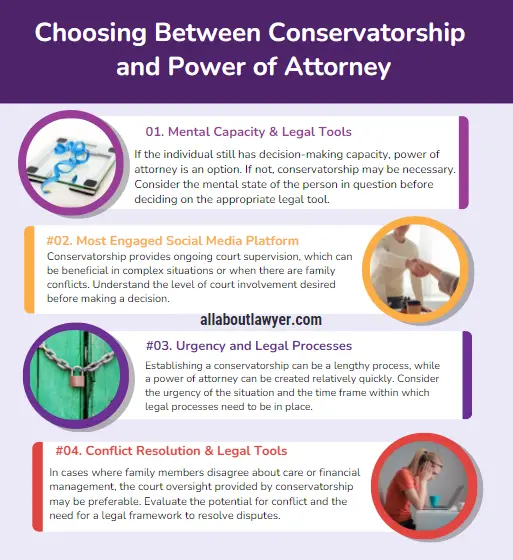Is Conservatorship the Same as Power of Attorney? Legal Guardianship
In the United States, an estimated 16 million older adults face challenges with independent living, and about 6.7 million require assistance managing their finances and healthcare decisions. As the population ages, ensuring the well-being and financial stability of those with diminished capacity has become a growing concern. In this context, two legal tools—conservatorship and power of attorney—are frequently mentioned. While both serve the purpose of authorizing someone to make decisions on behalf of another, they are not the same and differ in their legal implications and applications.
Table of Contents
Defining Conservatorship and Power of Attorney
Before delving into the differences, it’s crucial to establish clear definitions for both terms:
Conservatorship:
A conservatorship, also known as legal guardianship in some jurisdictions, is a court-appointed arrangement where a person or organization is given the legal authority to make decisions for an individual who is deemed incapable of managing their own affairs. This court-ordered care typically covers financial matters, personal care, or both.
Power of Attorney:
Power of attorney (POA) is a legal document that allows an individual (the principal) to designate another person (the agent or attorney-in-fact) to make decisions on their behalf. This voluntary delegation of authority can cover financial, medical, or both types of decisions, depending on the specific powers granted in the document.
Key Differences Between Conservatorship and Power of Attorney
While both conservatorship and power of attorney involve decision-making authority for another person, several key factors distinguish these legal arrangements:
1. Establishment Process
– Conservatorship: Requires a court proceeding, where a judge determines the need for a conservator based on evidence of the individual’s incapacity.
– Power of Attorney: Created voluntarily by an individual who must have the mental capacity to understand and execute the document.
2. Timing of Creation
– Conservatorship: Typically established after an individual has lost the capacity to make decisions for themselves.
– Power of Attorney: Must be created while the principal still has the mental competency to make legal decisions.
3. Scope of Authority
– Conservatorship: The conservator’s powers are defined and limited by the court order.
– Power of Attorney: The agent’s authority is defined by the principal in the POA document and can be as broad or limited as desired.

4. Oversight and Accountability
– Conservatorship: Involves ongoing court supervision, with the conservator typically required to file regular reports and accountings.
– Power of Attorney: Generally does not involve court oversight, though the agent has a fiduciary duty to act in the principal’s best interests.
5. Flexibility and Modification
– Conservatorship: Changes to the arrangement require court approval.
– Power of Attorney: Can be modified or revoked by the principal as long as they maintain mental capacity.
6. Duration
– Conservatorship: Usually continues until the protected person regains capacity, passes away, or the court determines it’s no longer necessary.
– Power of Attorney: Can be set for a specific period or continue indefinitely, often remaining in effect even if the principal becomes incapacitated (in the case of a durable POA).
Related Articles For You:
How to Get Power of Attorney for Your Spouse?
What is Reasonable Compensation for a Power of Attorney?
When is Conservatorship Appropriate?
Conservatorship is typically considered in situations where:
1. An individual has already lost the capacity to make sound decisions due to cognitive decline, mental illness, or severe physical disability.
2. There is no valid power of attorney in place.
3. The person’s well-being or assets are at risk due to their inability to manage their affairs.
4. There are concerns about exploitation or undue influence from others.
Examples of situations where conservatorship might be necessary include:
– An elderly person with advanced dementia who can no longer manage their finances or healthcare decisions.
– A younger adult with severe mental illness who is unable to care for themselves or manage their affairs.
– An individual who has suffered a traumatic brain injury and lacks decision-making capacity.
The Role of a Conservator
A court-appointed conservator has specific duties and responsibilities, which may include:
1. Managing the conservatee’s finances and assets
2. Making healthcare decisions
3. Determining living arrangements
4. Protecting the conservatee from exploitation
5. Reporting regularly to the court on the conservatee’s status and financial matters
The conservator must always act in the best interests of the conservatee and within the scope of authority granted by the court.
When is Power of Attorney Preferable?
Power of attorney is often the preferred option when:
1. An individual is still mentally competent but wants to plan for future incapacity.
2. There’s a desire for more flexibility in decision-making authority.
3. The person wants to avoid the cost and public nature of court proceedings.
4. There’s a trusted individual who can act as the agent.
Common scenarios where power of attorney is useful include:
– An aging parent granting financial power of attorney to an adult child to help manage their affairs.
– An individual creating a healthcare power of attorney to ensure their medical wishes are followed if they become incapacitated.
– A business owner designating someone to make business decisions on their behalf during an extended absence.
Types of Power of Attorney
There are several types of power of attorney, each serving different purposes:
1. General Power of Attorney: Grants broad authority to the agent to handle various matters.
2. Limited or Special Power of Attorney: Gives the agent authority for specific tasks or for a limited time.
3. Durable Power of Attorney: Remains in effect even if the principal becomes incapacitated.
4. Springing Power of Attorney: Only becomes effective under specific circumstances, usually when the principal becomes incapacitated.
Choosing Between Conservatorship and Power of Attorney
When deciding between these legal tools, consider the following factors:
1. Current Mental Capacity:
If the individual still has decision-making capacity, power of attorney is an option. If not, conservatorship may be necessary.
2. Level of Court Involvement Desired:
Conservatorship provides ongoing court supervision, which can be beneficial in complex situations or when there are family conflicts.
3. Urgency of the Situation:
Establishing a conservatorship can be a lengthy process, while a power of attorney can be created relatively quickly.

4. Potential for Conflict:
In cases where family members disagree about care or financial management, the court oversight provided by conservatorship may be preferable.
5. Cost Considerations:
Conservatorship typically involves ongoing legal fees and court costs, while power of attorney is generally less expensive to establish and maintain.
Legal and Ethical Considerations Of Conservatorship And Power Of Attorney
Both conservatorship and power of attorney come with significant legal and ethical responsibilities:
1. Fiduciary Duty:
Both conservators and agents under a POA have a fiduciary duty to act in the best interests of the person they represent.
2. Potential for Abuse:
Both arrangements can be subject to abuse if the conservator or agent doesn’t act ethically. However, the court oversight in conservatorship can provide an additional layer of protection.
3. Privacy Concerns:
Conservatorship proceedings are typically a matter of public record, while power of attorney arrangements offer more privacy.
4. Autonomy and Self-Determination:
Power of attorney allows individuals to choose their own representative and specify their wishes, preserving a greater degree of autonomy.
Conclusion
While conservatorship and power of attorney both provide mechanisms for managing the affairs of individuals who need assistance, they are distinct legal concepts with significant differences in their establishment, scope, and oversight. Power of attorney offers a flexible, private option for those who can plan ahead, while conservatorship provides a court-supervised solution for those who have already lost capacity.
Understanding these differences is crucial for making informed decisions about legal representation and care management. Whether you’re planning for your own future or assisting a loved one, carefully consider the options available and consult with legal professionals to determine the most appropriate course of action for your specific situation.
FAQs
Q: Can someone with power of attorney override a conservatorship?
A: Generally, no. If a conservatorship is established, it typically supersedes any existing power of attorney. The court has the authority to revoke or limit previously granted powers of attorney.
Q: Is it possible to have both a conservatorship and a power of attorney?
A: While it’s possible, it’s uncommon and can lead to conflicts. If a conservatorship is established, the court usually addresses any existing powers of attorney, either revoking them or specifying how they will interact with the conservatorship.
Q: How long does it take to establish a conservatorship compared to creating a power of attorney?
A: Creating a power of attorney can be done relatively quickly, often in a matter of days. Establishing a conservatorship is a more lengthy process, typically taking several months due to court proceedings and requirements.
Q: Can a power of attorney prevent the need for a conservatorship?
A: Yes, in many cases. Having a comprehensive, durable power of attorney in place can often eliminate the need for a conservatorship if the individual becomes incapacitated.
Q: Who can challenge a conservatorship or power of attorney?
A: Family members, friends, or other interested parties can challenge both arrangements if they believe they’re not in the best interests of the individual or if there’s suspected abuse or mismanagement. For conservatorships, challenges are made through the court. For power of attorney, legal action may be necessary to contest the arrangement.
About the Author

Sarah Klein, JD, is an experienced estate planning attorney who has helped clients with wills, trusts, powers of attorney, and probate matters. At All About Lawyer, she simplifies complex estate laws so families can protect their assets, plan ahead, and avoid legal headaches during life’s most sensitive moments.
Read more about Sarah
